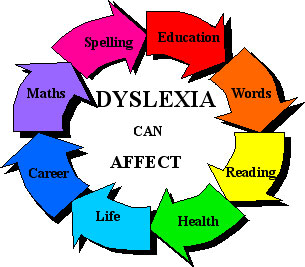Overcoming Dyslexia
Dyslexia
Dyslexia is considered a learning disability and a reading disability, although it is not an intellectual one. Some researchers say that 1 out of every 5 children is affected by dyslexia.
A kid turned 5 and still could not repeat the alphabet, a first grader looking at picture of a little dog and the word "puppy" underneath and says "dog",a 4th grader is crying over her homework every night, a 7th grader, who did well in grammar school is suddenly tanking, all are dyslexic.
An intelligent adult who loses words right before he speaks them, switching one word for another, one who reads arduously and slowly, one who uses simple words because he is afraid of pronouncing the better word he is thinking of, one who forget people's names easily, a poor speller, one who is creative and thinks outside the box, all may may be dyslexic.
Overcoming Dyslexia
There is a debate between the educators and researchers on the best way to overcome dyslexia. Educators have known that dyslexics learn best by "multi-sensory" methods like learning by repetition, using flash cards ...etc, while some researchers see that it is only phonics the way to learn.
For example, we don't mentally make a "w" sound /w/ a short "u" sound /u/ and a "z" sound /z/ when we look at the word "was." Instead we recognize it like an old friend. In fact, as we learn to decode more-and-more we sight read a far greater percentage.
Some people emphasize "reading along" as a way to develop sight recognition and fluency. Purely phonics-based instruction moves far too slowly toward that objective and results in students who sound-out familiar words long after they could recognize them.
The American National Reading Panel report that "Not all children learn in the same way and one strategy does not work for all children".

Overcoming Dyslexia Book - For Whom
Sally Shaywitz M.D., in her book "Overcoming Dyslexia" explains that magnetic resonance imaging has helped scientists trace the disability to a weakness in the language system at the phonological level. Dr. Shaywitz claims, that with the use of effective training programs, the brain can be rewired and dyslexic children can learn to read. Dr.Shaywitz stresses phonics to overcome the disability, although she delves in other methods sometimes.
The way the book is written creates discrepancy sometimes - and although many testimonies clarify that they have benefited from reading the book, an although some American States adopt her recommended curriculum -, yet those who want to buy the book may be distracted between the enthusiasts and the opponents. It is better if we try to define people who would benefit by buying this book.
The book may be beneficial for those people:
- Everyone who teaches reading in any capacity (home school to specialist)
- Special education teachers who need help to identify students who have reading problems, why they have them, and what interventions are effective
- Educators and parents who want to spot and understand dyslexia in a child
- Educators who want to explain the answer of the parents' question "Do you think my child is dyslexic?"
- Parents who must be the teacher of their child because of their location, or the lack of the lot of money required
- Parents who may have a child with reading difficulties, as they become the advocate of their child, and they will have the strategies to use at home, in an easy language
- Parents who want to be armed with the facts, not to depend on others' information - there is a huge disinformation out there
- Parents whose only knowledge about improving a child's reading is, modelling in clay, eye experience, or reading through colored plastic
- Parents who want to understand how their dylsexic child feels and how one as a parent can help him, and show the school how to help him
- Parents who feel school won't help and they feel helpless
- People who want a complete book about dyslexia
- If the term "dyslexia" or "dyslexic" is strange to you and you want to understand it
- If you have so many questions about dyslexia and want their scientific answers
- You want to know how dyslexia can be clinically diagnosed on scientific basis
- You want to be directed to important resources
- How to find a good school
- If you have dyslexia and you want to raise self esteem, by testimonies of famous and brilliant people who suffered with dyslexia
- People who want to feel empowered with strategies to help someone who is having a difficult time in learning to read
- Adult who suspects they are dyslexic may find the audio version is invaluable
- If you have read the text "Brain Literacy for Educators and Psychologists" by Dr.s V. Berninger and T. Richards, and you want to understand about brain science and dyslexia
- People who want to understand how reading problems start slowly and build slowly, and they are solved slowly and patiently as well
- People who want combining the science and the human side of dyslexia
- People who want the means to to help re-mediate the problem (rather than simply accommodate)
Dyslexic Famous People


Other Hubs
- The Diet Solution Basics
The Diet Solution Basics : A review of the basics of weight loss, as well as the diet solution program and how far it copes with these basics.









